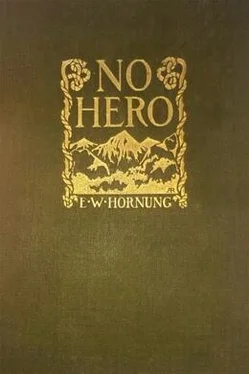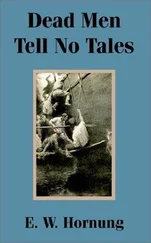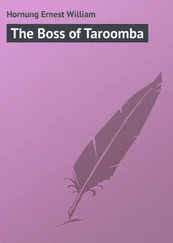E. Hornung - No Hero
Здесь есть возможность читать онлайн «E. Hornung - No Hero» весь текст электронной книги совершенно бесплатно (целиком полную версию без сокращений). В некоторых случаях можно слушать аудио, скачать через торрент в формате fb2 и присутствует краткое содержание. Год выпуска: 2017, Издательство: epubBooks Classics, Жанр: Классический детектив, на английском языке. Описание произведения, (предисловие) а так же отзывы посетителей доступны на портале библиотеки ЛибКат.
- Название:No Hero
- Автор:
- Издательство:epubBooks Classics
- Жанр:
- Год:2017
- ISBN:нет данных
- Рейтинг книги:5 / 5. Голосов: 1
-
Избранное:Добавить в избранное
- Отзывы:
-
Ваша оценка:
- 100
- 1
- 2
- 3
- 4
- 5
No Hero: краткое содержание, описание и аннотация
Предлагаем к чтению аннотацию, описание, краткое содержание или предисловие (зависит от того, что написал сам автор книги «No Hero»). Если вы не нашли необходимую информацию о книге — напишите в комментариях, мы постараемся отыскать её.
.’
No Hero — читать онлайн бесплатно полную книгу (весь текст) целиком
Ниже представлен текст книги, разбитый по страницам. Система сохранения места последней прочитанной страницы, позволяет с удобством читать онлайн бесплатно книгу «No Hero», без необходимости каждый раз заново искать на чём Вы остановились. Поставьте закладку, и сможете в любой момент перейти на страницу, на которой закончили чтение.
Интервал:
Закладка:
Upon the terrace on the other side, when I eventually came down, there were cane chairs and Tauchnitz novels under the umbrella tents, and the telescope out and trained upon a party on the Matterhorn. A group of people were waiting turns at the telescope, my friend Quinby and the hanging judge among them. But I searched under the umbrella tents as well as one could from the top of the steps before hobbling down to join the group.
"I have looked for an accident through that telescope," said the jocose judge, "fifteen Augusts running. They usually have one the day after I go."
"Good morning, sir!" was Quinby's greeting; and I was instantly introduced to Sir John Sankey, with such a parade of my military history as made me wince and Sir John's eye twinkle. I fancied he had formed an unkind estimate of my rather overpowering friend, and lived to hear my impression confirmed in unjudicial language. But our first conversation was about the war, and it lasted until the judge's turn came for the telescope.
"Black with people!" he ejaculated. "They ought to have a constable up there to regulate the traffic."
But when I looked it was long enough before my inexperienced eye could discern the three midges strung on the single strand of cobweb against the sloping snow.
"They are coming down," explained the obliging Quinby. "That's one of the most difficult places, the lower edge of the top slope. It's just a little way along to the right where the first accident was…. By the way, your friend Evers says he's going to do the Matterhorn before he goes."
It was unwelcome hearing, for Quinby had paused to regale me with a lightning sketch of the first accident, and no one had contradicted his gruesome details.
" Is young Evers a friend of yours?" inquired the judge.
"He is."
The judge did not say another word. But Quinby availed himself of the first opportunity of playing Ancient Mariner to my Wedding Guest.
"I saw you talking to them," he told me confidentially, "last night, you know!"
"Indeed."
He took me by the sleeve.
"Of course I don't know what you said, but it's evidently had an effect. Evers has gone off alone for the first time since he has been here."
I shifted my position.
"You evidently keep an eye on him, Mr. Quinby."
"I do, Clephane. I find him a diverting study. He is not the only one in this hotel. There's old Teale on his balcony at the present minute, if you look up. He has the best room in the hotel; the only trouble is that it doesn't face the sun all day; he's not used to being in the shade, and you'll hear him damn the limelight–man in heaps one of these fine mornings. But your enterprising young friend is a more amusing person than Belgrave Teale."
I had heard enough of my enterprising young friend from this quarter.
"Do you never make any expeditions yourself, Mr. Quinby?"
"Sometimes." Quinby looked puzzled. "Why do you ask?" he was constrained to add.
"You should have volunteered instead of Mrs. Lascelles to–day. It would have been an excellent opportunity for prosecuting your own rather enterprising studies."
One would have thought that one's displeasure was plain enough at last; but not a bit of it. So far from resenting the rebuff, the fellow plucked my sleeve, and I saw at a glance that he had not even listened to my too elaborate sarcasm.
"Talk of the—lady!" he whispered. "Here she comes."
And a second glance intercepted Mrs. Lascelles on the steps, with her bold good looks and her fine upstanding carriage, cut clean as a diamond in that intensifying atmosphere, and hardly less dazzling to the eye. Yet her cotton gown was simplicity's self; it was the right setting for such natural brilliance, a brilliance of eyes and teeth and colouring, a more uncommon brilliance of expression. Indeed it was a wonderful expression, brave rather than sweet, yet capable of sweetness too, and for the moment at least nobly free from the defensive bitterness which was to mark it later. So she stood upon the steps, the talk of the hotel, trailing, with characteristic independence, a cane chair behind her, while she sought a shady place for it, even as I had stood seeking for her: before she found one I was hobbling toward her.
"Oh, thanks, Captain Clephane, but I couldn't think of allowing you! Well, then, between us, if you insist. Here under the wall, I think, is as good a place as any."
She pointed out a clear space in the rapidly narrowing ribbon of shade, and there I soon saw Mrs. Lascelles settled with her book (a trashy novel, that somehow brought Catherine Evers rather sharply before my mind's eye) in an isolation as complete as could be found upon the crowded terrace, and too intentional on her part to permit of an intrusion on mine. I lingered a moment, nevertheless.
"So you didn't go to that hut after all, Mrs. Lascelles?"
"No." She waited a moment before looking up at me. "And I'm afraid Mr. Evers will never forgive me," she added after her look, in the rich undertone that had impressed me overnight, before the cigarette controversy.
I was not going to say that I had seen Bob before he started, but it was an opportunity of speaking generally of the lad. Thus I found myself commenting on the coincidence of our meeting again—he and I—and again lying before I realised that it was a lie. But Mrs. Lascelles sat looking up at me with her fine and candid eyes, as though she knew as well as I which was the real coincidence, and knew that I knew into the bargain. It gave me the disconcerting sensation of being detected and convicted at one blow. Bob Evers failed me as a topic, and I stood like the fool I felt.
"I am sure you ought not to stand about so much, Captain Clephane."
Mrs. Lascelles was smiling faintly as I prepared to take her hint.
"Doesn't it really do you any harm?" she inquired in time to detain me.
"No, just the opposite. I am ordered to take all the exercise I can."
"Even walking?"
"Even hobbling, Mrs. Lascelles, if I don't overdo it."
She sat some moments in thought. I guessed what she was thinking, and I was right.
"There are some lovely walks quite near, Captain Clephane. But you have to climb a little, either going or coming."
"I could climb a little," said I, making up my mind. "It's within the meaning of the act—it would do me good. Which way will you take me, Mrs. Lascelles?"
Mrs. Lascelles looked up quickly, surprised at a boldness on which I was already complimenting myself. But it is the only way with a bold woman.
"Did I say I would take you at all, Captain Clephane?"
"No, but I very much hope you will."
And our eyes met as fairly as they had done by matchlight the night before.
"Then I will," said Mrs. Lascelles, "because I want to speak to you."
Chapter V
A Marked Woman
We had come farther than was wise without a rest, but all the seats on the way were in full view of the hotel, and I had been irritated by divers looks and whisperings as we traversed the always crowded terrace. Bob Evers, no doubt, would have turned a deaf ear and a blind eye to them. I myself could pretend to do so, but pretence was evidently one of my strong points. I had not Bob's fine natural regardlessness, for all my seniority and presumably superior knowledge of the world.
So we had climbed the zigzags to the right of the Riffelberg and followed the footpath overlooking the glacier, in the silence enjoined by single file, but at last we were seated on the hillside, a trifle beyond that emerald patch which some humourist has christened the Cricket–ground. Beneath us were the serracs of the Gorner Glacier, teased and tousled like a fringe of frozen breakers. Beyond the serracs was the main stream of comparatively smooth ice, with its mourning band of moraine, and beyond that the mammoth sweep and curve of the Th?dule where these glaciers join. Peak after peak of dazzling snow dwindled away to the left. Only the gaunt Riffelhorn reared a brown head against the blue. And there we sat, Mrs. Lascelles and I, with all this before us and a rock behind, while I wondered what my companion meant to say, and how she would begin.
Читать дальшеИнтервал:
Закладка:
Похожие книги на «No Hero»
Представляем Вашему вниманию похожие книги на «No Hero» списком для выбора. Мы отобрали схожую по названию и смыслу литературу в надежде предоставить читателям больше вариантов отыскать новые, интересные, ещё непрочитанные произведения.
Обсуждение, отзывы о книге «No Hero» и просто собственные мнения читателей. Оставьте ваши комментарии, напишите, что Вы думаете о произведении, его смысле или главных героях. Укажите что конкретно понравилось, а что нет, и почему Вы так считаете.










